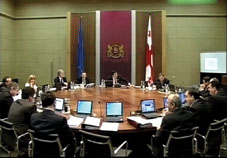Saakashvili says to be patient but bold, as Russia deepens links to separatist regions
By Winston Featherly
Friday, April 18

Russian President Vladimir Putin ordered increased cooperation and support for Georgia’s secessionist Abkhazia and South Ossetia on April 16, and the fostering of trade and legal ties.
In a cabinet meeting televised live yesterday, President Mikheil Saakashvili said he was “astounded and outraged” at Moscow’s decision. He heaped backhanded praise on the international community for its rebuke of the move, saying it was the first time Georgia’s allies had offered such unequivocal support for Georgia and censure for Russia.
“Russia had grown used to many in the international community swallowing whatever it does,” the president said. “I think [this] was the start of a reversal of this stance. So we must be patient and steadfast, but also bold.”
American, British, French and EU officials have criticized the move to increase ties with the separatist regions, and NATO’s chief said he was “deeply concerned” with Russia’s actions, urging Moscow to reverse its measures.
Still unclear is the extent of Moscow’s revision to the status quo.
The Russian president instructed his government to deal with the “actual bodies of power”—the separatist administrations—of de facto independent Abkhazia and South Ossetia. According to the Georgian Foreign Ministry, Moscow will now recognize Abkhaz passports and legal bodies in the two regions, and offer consular services from across the border to Abkhazian and South Ossetia residents.
Abkhaz officials suggested there could be other cooperation, including limited military equipping, between the two breakaway regions and Russia, which still officially recognizes Georgian jurisdiction in both territories.
The move brings Abkhazia, its de facto foreign minister Sergey Shamba suggested, one step away from Russian recognition of its independence.
It also put the situation on edge yesterday.
“We take this very seriously and think it is very dangerous. This is no game,” State Minister for Euro-Atlantic Integration Giorgi Baramidze told reporters. “This isn’t even the creeping annexation which Russia had been doing until now. This is a move which is qualitatively more serious.”
The Georgian Foreign Ministry released a statement condemning Russia’s decision as “yet another very dangerous step, which aims to legalize the factual annexation” of Abkhazia and South Ossetia.
“…This decision of Russia poses an open threat to Georgia’s statehood and sovereignty and is designed to launch a full-scale annexation process of the part of the Georgian territory,” the statement read.
Georgia’s deputy defense minister had to emphasize that there are no plans for a military operation to take back Abkhazia, while de facto Abkhaz president Sergey Bagapsh said he would deploy troops if an alleged build-up of heavy Georgian forces near the administrative border with Abkhazia is not explained.
A high-ranking Russian MP suggested that Moscow’s step was retaliation for Saakashvili’s aggressive stance toward the Kremlin.
First deputy chair of the Russian Duma’s international affairs committee Leonid Slutskiy, speaking with the ITAR-TASS news agency yesterday, contrasted Georgia’s behavior with that of Moldova, another country contending with Russian-backed separatists.
“Measures like this simply aren’t necessary for [cooperative countries like Moldava],” he said.
The Saakashvili administration has tacked westwards since coming to power in 2003, angering Moscow with a vigorous bid for NATO membership.
At the NATO summit in Bucharest earlier this month, Georgia’s bid for the next level in the accession process was vetoed by Germany and France. The alliance instead offered a statement promising eventual membership for Georgia and Ukraine.
Tbilisi, though claiming to have come out on top at the NATO summit, blamed Russian influence for Germany’s intransigence.
